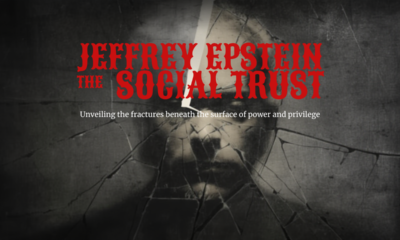Executive
Censorship advocates come out of the woodwork
A leftist voting-access network, and a group of 21 leftist attorneys general, openly advocated for censorship in friend-of-the-court briefs.
The case of Missouri v. Biden saw some interesting updates in the last Friday in July (the 28th). On that day, three friend-of-the-court briefs came in. One came from the Electronic Frontier Foundation, and affected a neutral stance. They seem to think Judge Terry A. Doughty paid scant attention to nuance in his preliminary injunction. The other two came out squarely for vacating the injunction and letting the government, and the big platforms, do as they please, by what they insist is mutual agreement for the common good. In short, two of the three briefs advocated for absolute and unrestrained censorship.
Current status of Missouri v. Biden
Missouri v. Biden (now consolidated with Kennedy v. Biden) is still on appeal. The Fifth Circuit Court of Appeals has scheduled the case for oral argument on August 10. Both parties have moved jointly to extent the time for each side from twenty minutes to thirty. The Fifth Circuit has granted that motion.
Friend-of-the-court briefs in support of the appellants (who are the government defendants) were due July 28. As noted above, three have come in. The three are from:
- The Electronic Frontier Foundation, which advertises itself as favoring freedom of speech,
- Common Cause, Brennan Center for Justice (NYU School of Law), and the Lawyers’ Committee for Civil Rights Under Law, and
- The Attorneys General of twenty “blue” States, and the District of Columbia.
One can read each of the respective briefs at these links: EFF, Brennan, and States. Friend-of-the-court briefs in support of the appellees (meaning the plaintiffs) are due Monday, August 7.
The EFF Brief: when is censorship permissible?
The position of the Electornic Frontier Foundation is difficult to discern. As mentioned, they seem to think Judge Doughty failed to recognize when government communication with trust and safety staff might be proper. So the Foundation sought to articulate a standard for recognizing “proper” communication by the government with social media moderators.
They rely on the case of Bantam Books v. Sullivan, a 1963 case involving the banning of pornographic books. The sticking point is that not every treatment of sexual matters is necessarily obscene. Some treatments are; some aren’t. So the EFF suggests that some communication by government to content moderators is proper and wise.
What sort of things fall into that category? The EFF cites polling place location and hours, disaster evacuation routes, and street and road closures. They also say the courts should leave the government free to criticize a trust and safety team if they think they’re compromising public safety.
The EFF then discusses some examples of what they suggest is actionable misinformation. These include scams – obvious intent to deceive for material gain. Finally they observe that different social media platforms have different standards – standards that they invent.
But the EFF brief does not show how Judge Doughty could have crafted his injunction differently. In fact, the judge did allow the government to pursue obvious criminal activity. Nor does the brief try to set any standard for “good” or “bad” content standards. For that reason, CNAV doubts their brief will be very helpful.
The Brennan Brief: defending the status quo in elections
The Brennan Brief concerns itself with one issue only: election integrity. They maintain that the only threats to election integrity comes from those who suggest that elections are less than honest. And small wonder. The Lawyers’ Committee for Civil Rights Under Law concerns itself with the civil rights of blacks – only. Likewise, the Brennan Center advertises itself as concerned that every vote will count. Common Cause is – well, Common Cause. Their brief has always been leftist since their founding.
All three are charter members of Election Protection, which has existed since 2002. Their home page uses a common leftist buzzphrase: “voter suppression.” But to them, “voter suppression” extends to efforts to make sure that those who show up to vote:
- Genuinely have the right to vote in their own names,
- Are not voting in the names of the dead, and
- Are not voting twice or more often in the same election.
Though they deny any affiliation with any particular party, their activities benefit Democrats exclusively.
Typical of the stories they promote to enhance their image is this piece by Sue Halpern in The New Yorker. She speaks of polling places lacking power cords for electronic voting machines, and other equipment failures that caused voters to walk away. That happened in 2018. So where was she in the disaster that was the Midterm Election in Maricopa County, Arizona? Answer: nowhere to be found. The very problems she highlighted, evidently were acceptable when a Republican lost.
Arguing an indirect effect
The Brennan brief calls the preliminary injunction a “prior restraint” on their activities. They quote the injunction as forbidding the government to collaborate with the Election Integrity Project “or any like project or group.” One presumes they believe Election Protection to be a “like group” to the EIP. Furthermore the injunction forbids anyone to “act in concert” with the government for censorship.
But their case fails from the beginning of their “factual background.” The preliminary injunction specifically allows the government to act against every legitimate concern they raise. To be clear: one may raise legitimate concern about sending people to the wrong place to vote. (Or telling people a polling place will be open longer than it is, or falsely claiming that it has closed.) But what are we to make of a concern about “untrue claims”? Of course the government remains free to publish election results. But “untrue claims about election security” center on the vulnerability of voting machines. First, Dominion Voting Systems, the largest purveyor of electronic voting machines, admitted their vulnerability. (Or if they didn’t, the legacy media did.) Second, the French conduct their elections on paper – out of the same concerns Americans are now raising about voter security. How dare these “friends of the court” suggest that every concern about election security is misplaced?
Finally, they brought out the Russia, Russia, Russia scare. Time was when the left supported all things Russian. But that was when it called itself “Soviet Union.” Not today.
Censorship now and forever
In general, the Brennan brief makes three kinds of factual error. First they hide the injunction’s exemption of communication about obvious criminal behavior and real, indefensible fraud. Second, they make claims about the concerns of others that are simply not true. Third, they claim they themselves would run afoul of the injunction in ways they clearly would not.
We turn now to the States’ Brief. It speaks far more broadly than does the Brennan Brief, and says that certain persons, who are stating opinions they do not like, are endangering the public safety and health. But the “harm” from the examples they cite is debatable. The States claim to want “open discourse on content moderation.” But secret meetings between intelligence operatives and Trust and Safety teams are closed by definition.
The States’ Brief also says the communications from the government are “purely recommendatory and non-coercive.” That would be funny were it not so sad. More to the point, they speak of the federal government’s “essential role … in contributing to the marketplace of ideas.” News flash: the federal government does not contribute. It can only cancel someone else’s contribution, a thing we call censorship.
Again, the States conflate legitimate concerns – like protecting minors from online predators – with clearly illegitimate concerns – like saying the COVID vaccines are safe and effective, when they are dangerous and countereffective. (And how dare they speak of protecting minors, while letting quacksalvers surgically mutilate and hormonally poison minors? “Gender affirming care,” they call it.)
A one-sided concern
CNAV tips the hat to Tracy Beanz, who alerted her followers to two of these three briefs. We have decided not to publish her entire thread, preferring instead to read the briefs for ourselves. But this post illustrates brilliantly what is wrong with the States’ brief:
Why, indeed, would not every State sign onto this brief, if the concerns were legitimate? Why, for instance, does Texas not sign onto this brief? Texas has an abiding interest in fighting child trafficking and online child solicitation. For that matter, why didn’t Missouri and Louisiana, the “State plaintiffs,” brief Judge Doughty immediately if they saw a problem?
The answer, of course, is that Judge Doughty did not ignore legitimate concerns about criminal activity. Indeed he specifically addressed such obvious election interference as misleading voters as to polling place addresses and hours of operation. The “red States” didn’t brief in support of the appellants because they saw no legitimate concern that Judge Doughty failed to take into account. Perhaps they will brief in support of the plaintiff-appellees. (And as for Texas, they did something about one source of child trafficking. They strung buoys down the middle of the Rio Grande. And the federal government is trying to sue that barrier away. This after they ordered a Border Patrol squad to cut away another barrier Texas had erected.)
In sum: the Brennan and States’ briefs are totally self-serving. Sadly, the Electronic Frontier Foundation has only created confusion with its brief.
Terry A. Hurlbut has been a student of politics, philosophy, and science for more than 35 years. He is a graduate of Yale College and has served as a physician-level laboratory administrator in a 250-bed community hospital. He also is a serious student of the Bible, is conversant in its two primary original languages, and has followed the creation-science movement closely since 1993.
-

 Civilization3 days ago
Civilization3 days agoWhy Europe Shouldn’t Be Upset at Trump’s Venezuelan Actions
-

 Executive4 days ago
Executive4 days agoHow Relaxed COVID-Era Rules Fueled Minnesota’s Biggest Scam
-

 Constitution5 days ago
Constitution5 days agoTrump, Canada, and the Constitutional Problem Beneath the Bridge
-

 Christianity Today3 days ago
Christianity Today3 days agoSurprising Revival: Gen Z Men & Highly Educated Lead Return to Religion
-

 Civilization4 days ago
Civilization4 days agoThe End of Purple States and Competitive Districts
-

 Executive3 days ago
Executive3 days agoWaste of the Day: Can You Hear Me Now?
-

 Executive4 days ago
Executive4 days agoWaste of the Day: States Spent Welfare in “Crazy Ways”
-

 Guest Columns5 days ago
Guest Columns5 days agoWhy We Need Lent








